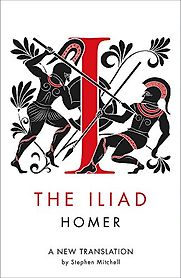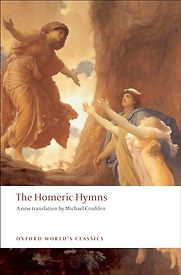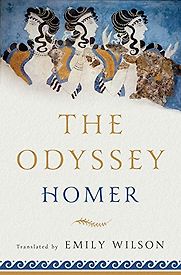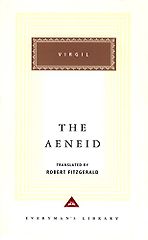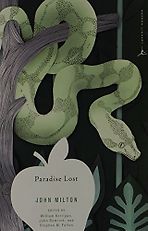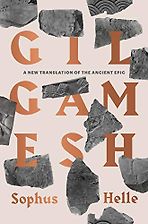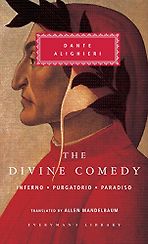The Iliad
by Homer
“The rage of Achilles—sing it now, goddess, sing through me
the deadly rage that caused the Achaeans such grief
and hurled down to Hades the souls of so many fighters,
Leaving their naked flesh to be eaten by dogs
and carrion birds, as the will of Zeus was accomplished”
—Iliad, opening lines (Stephen Mitchell translation)
The Iliad, a Greek poem dating from around 700 BCE, is a defining text of western literature. If you want to see what academics say about it and its author(s), Homer, start with our interview with Christopher Pelling, Regius Professor of Greek Emeritus at Oxford University, below.
Which translation of the Iliad should you read? British actor and author Stephen Fry recommends either Robert Fagles’s translation (1969), or that of poet and translator Stephen Mitchell, which was published in 2011.
Of course all those millennia ago, the Iliad would have been principally listened to, and modern technology means that’s once again easily possible by listening to the poem as an audiobook. Our own Iliad audiobook is the Robert Fagles translation, magnificently narrated by the British actor—and veteran of the British Classics scene—Derek Jacobi. You can also opt for the audiobook of the Stephen Mitchell translation, which is narrated by the English-American actor Alfred Molina.
So find a fireside to settle down next to, imagine a bard who has memorised hundreds of lines of poetry, plug in your headphones, and press play.
Recommendations from our site
“It is worth remembering of course that Homer’s Iliad doesn’t cover the causes of the War … the Apple of Discord, the Judgement of Paris, birth of Achilles and Abduction of Helen and so on – nor the end of the war. The action of the Iliad begins in the final year of the ten year siege of Troy and dramatises the weeks that begin with the feud between Agamemnon and Achilles and end with the death of Hector.” Read more...
Stephen Fry, Comedians & Humorist
“Part of the Iliad’s brilliance is that it only takes four or five days of the action but you feel like it captures the 10 years’ war as a whole. There is a choice that Achilles has to make. He is told that he has two alternative fates: he could stay away from the war and live out a long life and nobody would ever know or remember him. Or he could go and win eternal fame and glory, but would have a short life. In a way, that is a version of a dilemma that keeps coming back.” Read more...
The best books on Ancient Greece
Christopher Pelling, Classicist
“The Iliad is absolutely extraordinary. I read it every so often, from the beginning it has the most incredible evocation of place, on the beach with the camp fires and Achilles sulking in his tent. There’s such a sense of camaraderie between these warriors. It’s an ancient culture, completely foreign to us now, and yet somehow we are brought to feel their day-to-day emotions. Not just on the Greek side, on the Trojan side as well. There are poignant moments, for example where Hector’s going in to fight and his wife Andromache doesn’t want him to. It’s an extraordinarily vivid account of war and a very graphic one…..A lot of people who had public school educations, classical educations, might have gone into the First World War thinking that they were fighting Homer’s war.” Read more...
Kate McLoughlin, Literary Scholar
“There are always new translations of The Iliad coming out, but this one has a very specific approach, both in terms of its philosophy of translation and its approach to the text. For a number of generations now, there has been an orthodoxy among classicists that the Homeric poems were orally composed and transmitted, and represent a series of adaptations, expansions and editings that took place during performance. Rejecting that idea is the eminent classicist Martin West, who thinks that there really was a Homeric figure – an original poet who accumulated a number of texts and wrote down what we would call a definitive text of The Iliad.” Read more...
Updated Classics (of Greek and Roman Literature)
Daniel Mendelsohn, Memoirist
“I think The Iliad has much to say to politicians now – it’s completely clear-eyed about collateral damage, about problems of post-conflict and about the ghastly things that happen to women and children in war.” Read more...
The Greats of Classical Literature
Charlotte Higgins, Journalist
Our most recommended books
-

The Aeneid (Robert Fitzgerald translation)
by Virgil -

Paradise Lost
by John Milton -

The Odyssey
by Homer and translated by Emily Wilson -

Staying Alive
by Neil Astley (editor) -

The Epic of Gilgamesh
by Anonymous & Sophus Helle (translator) -

The Divine Comedy: Inferno, Purgatorio, Paradiso
by Dante Alighieri
